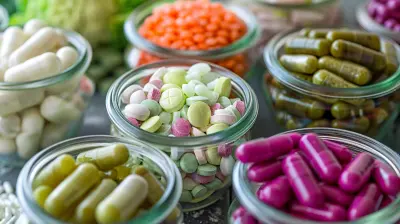Strengthening Immunity in Older Adults: Key Insights
29 August 2025
Aging is a beautiful journey, filled with wisdom and life experiences. But let's be honest—our immune system doesn’t quite hold up like it used to. As we grow older, our body's defense mechanism weakens, making us more susceptible to infections, illnesses, and chronic conditions.
So, what can we do to keep our immunity strong and resilient? The good news is, there's plenty! From lifestyle habits to dietary choices, small, consistent changes can make a big difference. Let’s dive into some key insights on how older adults can strengthen their immune system and enjoy a healthier, more vibrant life. 
Understanding the Immune System and Aging
Before we jump into boosting immunity, it’s important to understand how aging impacts our body's defense mechanism.As we age:
- The production of immune cells slows down.
- The body’s ability to fight infections weakens.
- Chronic inflammation increases, which can contribute to health issues.
- The response to vaccines may not be as strong.
So, does that mean we’re powerless against a weaker immune system? Absolutely not! With the right steps, we can support and strengthen our immunity at any age. 
1. Prioritize a Nutrient-Rich Diet
They say, "You are what you eat," and when it comes to immunity, this couldn't be more true. A well-balanced diet packed with essential nutrients is the foundation of a strong immune system.Key Nutrients for Immune Health
- Vitamin C – Essential for immune function. Found in oranges, bell peppers, strawberries, and broccoli.- Vitamin D – Helps regulate the immune response. Get it from sunlight, fatty fish, and fortified dairy products.
- Zinc – Supports immune cell function. Found in nuts, seeds, beans, and lean meats.
- Probiotics & Prebiotics – A healthy gut plays a vital role in immunity. Consume yogurt, kefir, sauerkraut, garlic, and onions.
- Antioxidants – Help combat free radicals and reduce inflammation. Found in colorful fruits and vegetables.
Foods to Avoid
- Processed foods high in sugar and unhealthy fats.- Excessive alcohol, which weakens immune defense.
- Too much sodium, which can lead to high blood pressure and inflammation.
Eating wholesome, natural foods fuels the body and arms it with the necessary tools to fight infections and stay strong. 
2. Stay Active and Exercise Regularly
Exercise isn’t just about building muscle or staying in shape—it also strengthens the immune system. Regular physical activity enhances circulation, reduces inflammation, and helps immune cells function efficiently.Best Exercises for Older Adults
- Walking – A low-impact way to keep the body moving.- Yoga – Improves flexibility, balance, and reduces stress.
- Strength Training – Helps maintain muscle mass and bone density.
- Swimming – Gentle on the joints while providing a great workout.
Aim for at least 150 minutes of moderate exercise per week to keep your immune system in top shape. 
3. Get Quality Sleep
Ever notice how you’re more likely to get sick when you’re sleep-deprived? That’s because sleep is crucial for immune function. When we rest, our body produces infection-fighting antibodies and repairs damaged cells.Tips for Better Sleep
- Stick to a consistent sleep schedule (even on weekends).- Create a relaxing bedtime routine (reading, soft music, or meditation).
- Keep your bedroom cool, dark, and quiet.
- Limit screen time before bed, as blue light can disrupt sleep.
Most adults need 7-9 hours of sleep per night for optimal immune function, so make it a priority!
4. Manage Stress Effectively
Chronic stress wreaks havoc on the immune system. When we’re stressed, our bodies release cortisol, a hormone that suppresses immune function over time. Learning to manage stress is key to staying healthy.Ways to Reduce Stress
- Practice deep breathing – Helps calm the mind and lower stress levels.- Engage in hobbies – Whether it’s gardening, painting, or reading, find something you love.
- Stay socially connected – Loneliness and isolation can weaken immunity, so maintain strong relationships.
- Try meditation or mindfulness – Helps reduce anxiety and promotes emotional well-being.
A little stress is normal, but learning to manage it can make a world of difference for your immune health.
5. Stay Hydrated
It’s easy to overlook hydration, but water plays a vital role in immune function. Staying hydrated helps flush toxins from the body, aids in digestion, and supports overall health.How Much Water is Enough?
Everyone’s needs are different, but as a general rule:- Aim for 8-10 cups of water per day.
- Increase intake if you're active or in hot weather.
- Herbal teas and water-rich fruits/vegetables can contribute to hydration.
If you often forget to drink water, try carrying a reusable bottle or setting reminders throughout the day.
6. Keep Up with Vaccinations
Vaccines aren’t just for kids—they’re equally important for older adults. As we age, our immune response to infections weakens, making vaccinations a critical step in illness prevention.Essential Vaccines for Older Adults
- Flu vaccine – Recommended annually.- Pneumonia vaccine – Protects against lung infections.
- Shingles vaccine – Helps prevent painful shingles outbreaks.
- COVID-19 vaccine – Protects against severe illness.
Discuss with your doctor which vaccines are best for you based on your health history. Prevention is always better than cure!
7. Avoid Smoking and Limit Alcohol
Smoking weakens the immune system and lowers the body's ability to fight infections. Similarly, excessive alcohol consumption can impair immune function, making you more susceptible to diseases.Healthier Alternatives
- If you smoke, consider quitting or seeking support.- If you drink alcohol, do so in moderation (up to one drink per day for women, two for men).
- Replace unhealthy habits with better ones like herbal teas, smoothies, and exercise.
Your body will thank you for making these changes!
8. Practice Good Hygiene
A strong immune system is great, but basic hygiene is the first line of defense against illness.Important Hygiene Habits
- Wash hands frequently with soap and water for at least 20 seconds.- Avoid touching your face, eyes, nose, and mouth with unwashed hands.
- Keep surroundings clean, including frequently-touched surfaces.
- Practice safe food handling to avoid contamination.
Following these simple hygiene tips significantly reduces the risk of infections.
Final Thoughts
Aging doesn’t mean you have to accept a weaker immune system. By making smart lifestyle choices, eating well, staying active, and managing stress, you can give your body the tools it needs to stay healthy and resilient.Your immune system is like a trusted friend—it will support you if you take care of it. So, start today! Small changes lead to big benefits, helping you live a longer, healthier, and more fulfilling life.
all images in this post were generated using AI tools
Category:
Immune SystemAuthor:

Eileen Wood
Discussion
rate this article
1 comments
Hadley Harris
Great tips! Strengthening immunity is so important for older adults. Thank you for sharing these insights!
September 22, 2025 at 4:18 AM

Eileen Wood
Thank you! I'm glad you found the tips helpful for promoting immunity in older adults.


